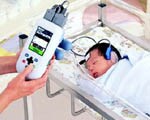Screening for hearing problems within the first weeks of life is beneficial for children especially when interventions quickly follow the detection of any impairment.

Hearing is essential to the development of speech and language and it is believed that early treatment of hearing loss, as this study would seem to indicate, results in better speech and language outcomes.
Researchers analysed outcomes of 570,386 Dutch babies born between 2003 and 2005, comparing children born in regions in which newborn hearing screening had already become the norm to those born where distraction hearing screening, a behavioural test conducted around the age of 9 months, continued to be the standard.
Among children undergoing newborn screening, fewer than one (0.78) of every 1,000 were diagnosed with hearing loss. Similarly, 0.73 of every 1,000 babies were diagnosed using the distraction hearing test. Compared to distraction screening (performed at around 9 months of age), the researchers found that newborn screening led to more spoken words and fewer signs, as well as better social and motor development at 3 to 5 years of age. These children also scored higher on measures of overall quality of life.
Two different types of hearing screening tests may be used to screen hearing in newborns. In one of the tests, called otoacoustic emissions, a miniature earphone and microphone are placed in the baby's ear, sounds are played, and a response is measured. If a baby hears normally, an echo is reflected back into the ear canal and is picked up by the microphone. When the baby has a hearing problem, no echo is heard.
In the other test, called auditory brainstem response, sounds are played in the baby's ears and band-aid-like electrodes are placed on the baby's head to detect responses. This test measures how the hearing nerve responds to sounds and can identify babies with hearing loss. Both tests are safe and comfortable.
When hearing loss is found, treatment can be implemented such as hearing aids, inner ear implants and speech and language development programmes. These treatments have benefits at all ages, but are better if provided early in life, as that is the time at which the infant brain is 'primed' for this kind of experience and learning.
In the 21st century, cognitive and communication abilities are at a premium. Our developed societies are dependent on high levels of literacy. Understanding and producing spoken words is a key to literacy. Thus, providing programmes, such as newborn hearing screening help achieve higher developmental outcomes and quality of life and become important for the future well-being of society. Unfortunately, as the researchers noted, not all detected hearing problems in the study were followed by early interventions. Further, passing newborn hearing screening does not exclude babies from developing hearing loss later in childhood.
Parents should take newborn hearing screening results seriously. If a child does not pass his newborn hearing screening, the child should be evaluated and tested by a specialist within the first few weeks of life.
DoctorNDTV is the one stop site for all your health needs providing the most credible health information, health news and tips with expert advice on healthy living, diet plans, informative videos etc. You can get the most relevant and accurate info you need about health problems like diabetes, cancer, pregnancy, HIV and AIDS, weight loss and many other lifestyle diseases. We have a panel of over 350 experts who help us develop content by giving their valuable inputs and bringing to us the latest in the world of healthcare.












